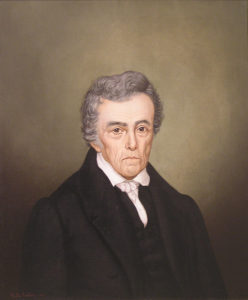Francois-Xavier Martin
Francois-Xavier Martin was the presiding judge of the Supreme Court of Louisiana from 1836 to 1846.

Courtesy of The Law Library of Louisiana
Francois-Xavier Martin. Coulon, George David (Artist)
François-Xavier Martin served as the third presiding judge—the equivalent of chief justice—of the Louisiana Supreme Court from November 15, 1836, to March 19, 1846. He compiled a digest of the state laws and, more importantly, wrote the first published history of Louisiana in 1827. Martin documented the development of the state from its founding and provided a source upon which later historians would rely.
Born into a prosperous family in Marseilles, France, on March 17, 1762, Martin was educated at home by the family priest. Although his father intended for him to enter the priesthood, Martin at age eighteen decided to join an uncle in business in Martinique. The business venture failed, and Martin, penniless, emigrated to North Carolina in 1783. He became a printer’s apprentice as a way to master the English language and went on to become very successful in the printing trade. He produced the first English translation of Robert Pothier’s A Treatise on Obligations Considered from a Moral and Legal View, published many law books and case reports in North Carolina, and was admitted to the bar in 1789. After a successful career as a lawyer in North Carolina he was elected in 1806 to the North Carolina legislature and served one term.
In 1809 Pres. James Madison appointed Martin to the post of federal judge for the Territory of Mississippi; in 1810 Martin transferred to New Orleans to serve on the Superior Court of the Territory of Orleans, succeeding Judge John Thompson. Gov. William C. C. Claiborne appointed Martin the first attorney general for Louisiana in 1813. In 1815 Martin was appointed judge of the Supreme Court of Louisiana, serving until 1846 for a total of thirty-one years, and as presiding judge for the final ten years of his time on the bench. Martin was uniquely qualified for his position: he communicated equally well in French and in English; his classical education afforded him an understanding of the Roman, French, and Spanish foundations of civil law in Louisiana; and his North Carolina law practice grounded him in the elements of American common law. His long tenure on the court provided continuity from the chaotic territorial period into established statehood. As judge, Martin participated in some of the thorniest and most significant legal questions raised in Louisiana, and he is often referred to as the “Father of Louisiana Jurisprudence.”
Martin’s work ethic and many abilities were aptly described by Lamar Quintero: “[he] was a man whose industry could not be appeased by any single employment.” Even as a busy judge, Martin carried on his publishing pursuits by reporting and publishing the first twenty volumes of decisions for both the Supreme Court of the Territory of Orleans and the Supreme Court of Louisiana.
Martin suffered from poor eyesight all his life, and he had become functionally blind by 1836. He sought treatment in Paris, but nothing could be done to restore his sight. He learned to live with his disability by dictating his opinions to a secretary for his last ten years as judge.
Martin’s personality quirks were well known. He amassed a fortune but spent little on his comfort or pleasure, and was described as unkempt—even slovenly. At times he was the butt of public ridicule for his stern and humorless demeanor, and was described by the distinguished lawyer John R. Grymes as “all head, and no heart.” A lifelong bachelor, Martin devoted himself exclusively to his work.
The state of Louisiana adopted a new constitution in 1845 that abolished the existing supreme court and reorganized the court system. Martin was forced to retire at age eighty-four on March 19, 1846. His death just nine months later, on December 10, 1846, came as no surprise, for without his work he had nothing else to live for. Yet, even in his death, Martin influenced the course of Louisiana law. His olographic will (a civil law term for a will written entirely by hand), written in 1844 after he became completely blind, was contested by the state, but the Louisiana Supreme Court allowed Martin’s bequest of his entire estate of $400,000 to his brother, Paul B. Martin, and thereby upheld the right of the blind to make olographic testaments. Martin is buried in New Orleans’s St. Louis Cemetery No. 2.
